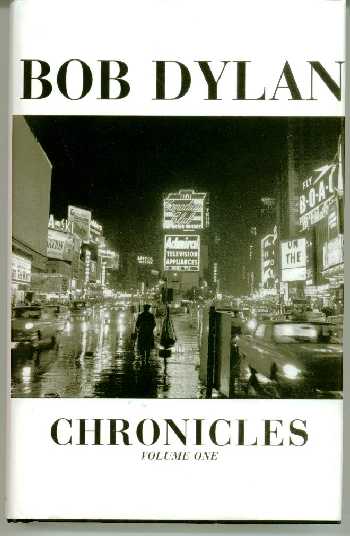A Spokesman for Distant Trains
 I guess I'm one of those rare people who likes Bob Dylan's work without worshipping him (or it) on some level; who believes he's produced plenty of great songs but doesn't think he's hands-down the greatest songwriter of all time; who can hear the deep imperfections in his voice but also believes he can sing.
I guess I'm one of those rare people who likes Bob Dylan's work without worshipping him (or it) on some level; who believes he's produced plenty of great songs but doesn't think he's hands-down the greatest songwriter of all time; who can hear the deep imperfections in his voice but also believes he can sing.I've had a copy of Dylan's memoir, Chronicles, for a couple of years now, and I decided to start it while preparing to write a review of I'm Not There, Todd Haynes' fractured biopic.
The book is a mess, but in the best way, Dylan spooling anecdotes and impressions and analyses without much thought to structure. Not a big surprise. It is surprising that he frequently opens up about intimate parts of himself and his environment:
I'd seen and heard trains from my earliest childhood days and the sight and sound of them always made me feel secure. The big boxcars, the iron ore cars, freight cars, passenger trains, Pullman cars. There was no place you could go in my hometown without at least some part of the day having to stop at intersections and wait for the long trains to pass. Tracks crossed the rural roads and ran alongside them as well. The sound of trains off in the distance more or less made me feel at home, like nothing was missing, like I was at some level place, never in any significant danger and that everything was fitting together.Many people find Dylan's work too obscure for their taste, but this excerpt, in which he describes a roommate of his in New York, shows that he's capable of being mystified himself:
Chloe slapped some steak and onions on my plate and said, "Here, it's good for you." She was cool as pie, hip from head to toe, a Maltese kitten, a solid viper -- always hit the nail on the head. I don't know how much weed she smoked, but a lot. She also had her own ideas about the nature of things, told me that death was an impersonator, that birth is an invasion of privacy. What could you say? You couldn't say anything back when she said stuff like that. It's not like you could prove her wrong. New York City didn't faze her at all. "A bunch of monkeys in this town," she'd say.Elsewhere, he writes about his famously contentious relationship with the press. It's hard to believe that Dylan can't see how he was often unnecessarily confrontational or evasive when questioned, but passages like this one have the ring of truth:
Reporters would shoot questions at me and I would tell them repeatedly that I was not a spokesman for anything or anybody and that I was only a musician. They'd look into my eyes as if to find some evidence of bourbon and handfuls of amphetamines. I had no idea what they were thinking. Later an article would hit the streets with the headline "Spokesman Denies That He's a Spokesman." I felt like a piece of meat that someone had thrown to the dogs. The New York Times printed quacky interpretations of my songs. Esquire magazine put a four-faced monster on their cover, my face along with Malcolm X's, Kennedy's and Castro's. What the hell was that supposed to mean? It was like I was on the edge of the earth. If anybody had any sound guidance or advice to offer, it wasn't forthcoming. My wife, when she married me, had no idea of what she was getting into. Me neither, actually, and now we were in a no win situation.In one way, I think Dylan is like a smart version of Yogi Berra. He once said, "If I wasn't Bob Dylan, I'd probably think that Bob Dylan has a lot of answers myself." And the book has plenty of that quick-hit quality, as when Dylan remembers standing in front of a friend's extensive library and writes, "you couldn't help but lose your passion for dumbness."


2 Comments:
I think I also fall into that category of someone who generally likes the music Dylan put out, I don't idolize it.
I have read Chronicles, though.
You have to admit though that the quote you post is highly a tuned to the current 24 hour news cycle and all of its failings. I am in the middle of chronicles and really like it. It's a bit difficult to imagine that he, Miles Davis, and Malcolm X are sharing New York City at more or less the same time. Yes, NYC is the capital of the world, and I am a native Californian living in Arizona.
Post a Comment
<< Home